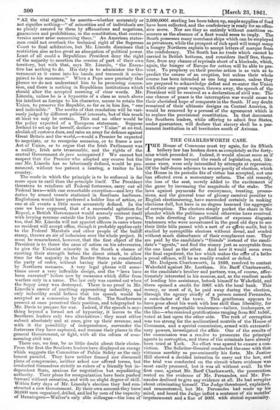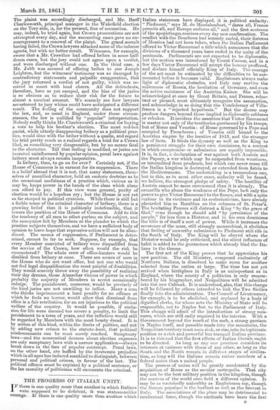THE CHARLESWORTH CASE. T HE House of Commons must try again,
for its fiftieth bribery law has broken down as completely as the forty- nine which preceded it. Indeed, it would almost seem as if the practice were beyond the reach of legislation, and, like some vices, were only intensified by attempts at repression. Of the half-dozen schemes to secure purity of election, which the House in its periodic fits of virtue has accepted, not one has effected even a momentary reform. The old remedy, the loss of the seat, merely added to the excitement of the game by increasing the magnitude of the stake. The laws against payments for conveyance, treating, proces- sions, and the general tone of gloomy carnival peculiar to English electioneering, have succeeded certainly in making elections dull, but have in no degree lessened the aggregate of corruption. The electors simply pocket the share in the plunder which the publicans would otherwise have received. The rule directing the publication of expenses disgusts tradesmen who were accustomed in the good old days to see their little bills passed with a sort of ex officio audit, but is studied by corruptible electors without dread, and evaded without much disturbance of their complacent ease. They are paid by the candidate's "friends" instead of the candi- date's "agents," and find the nioney just as acceptable from the one hand as the other. And now it would seem even the final expedient, the law which makes the offer of a bribe a penal offence, will be as readily evaded or defied. Mr. Dodgson. Charlesworth, in 1859, resolved to contest Wakefield against Mr. Leatham. Mr. Barff Charlesworth, as the candidate's brother and partner, was, of course, affec- tionately interested in his success, and, as the readiest mode of lending him assistance, betook himself to Wakefield, and there opened a credit for 500/. with the local bank. This money, or most of it, he paid away during the election, through the agency chiefly of a person named Fernandes, a corn-factor of the town. This gentleman appears to have gone about his work with less skill than liberality, for numbers of respectable tradesmen—tailors, innkeepers, or the like—who received gratifications ranging from 30/. to 50!., voted at last upon the other side. The reek of corruption was too strong for the acclimatized nostrils of the House of Commons, and a special commission, armed with extraordi- nary powers, investigated the affair. One of the results of the commission was a resolve to prosecute the principal agents in corruption, and three of the criminals have already been tried at York. No effort was spared to ensure a con- viction. The Solicitor-General conducted the case with that virtuous acerbity so pre-eminently his forte. Mr. Justice Hill showed a decided intention to carry out the law, and the trial was conducted on the circuit where evidence was most easily procured, but it was all without avail. In the first case, against Mr. Barff Charlesworth, the prosecution rested on the evidence of Mr. Fernandes, and Mr. Fer- nandes declined to give any evidence at all. He had scruples about criminating himself. The Judge threatened, explained, and remonstrated, but Mr. Fernandes had made up his mind, and heard the Judge inflict a sentence of six months' imprisonment and a fine of 500/. with stoical equanimity. The plaint was accordingly discharged, and Mr. Barff Charlesworth, principal manager in the Wakefield election on the Tory side, is, for the present, free of accusation. He may, indeed, be tried again, but Crown prosecutions are not attempted every day, and the succeeding cases gave no en- couragement to a renewal of the plaint. The grand assault having failed, the Crown lawyers attacked some of the inferior agents, but with no better result. Witnesses, for example, swore that a Mr. Crowther had offered bribes in some half- dozen cases, but the jury could not agree upon a verdict, and were discharged without one. In the third case, a Mr. Jubb was accused of offering bribes to one Joseph Leighton, -but the witnesses' testimony was so damaged by contradictory statements and palpable exaggeration, that the jury returned a verdict of not guilty, which was re- ceived in court with loud cheers. All the defendants, therefore, have as yet escaped, and the bias of the juries is so obvious as to reduce their risk for the future to almost a nominal amount. We scarcely see how lawyers accustomed to jury whims could have anticipated a different result. The feeling of the community does not support the law, and, as usual in England, under those circum- stances, the law is nullified by "popular" interpretation. Nobody really thinks Mr. Charlesworth a criminal for buying a vote to help his brother's election. The most red-hot purist, while utterly disapproving bribery as a political prac- tice, would dine with the briber without a qualm, and regard his trial pretty much as a radical regards a trial for a Crown libel, as something very disagreeable, but by no means fatal to the character. Till that feeling is modified, or juries are invented uninfluenced by popular opinion, penal laws against bribery must always remain inoperative. Is bribery, then, to go on for ever? Certainly not, if the House of Commons is in earnest for its suppression. There is a belief abroad that it is not, that many statesmen, them- selves of unsullied character, hold an esoteric doctrine as to the occasional usefulness of a practice which, vicious as it may be, keeps power in the hands of the class which alone can afford to pay. If this view were general, purity of election would be a hopeless cry ; but the House is not yet so far steeped in political cynicism. While there is still but a feeble sense of the criminal character of bribery, there is a growing belief that it is politically indefensible, that it lowers the position of the House of Commons. Add to this the tendency of all men to affect purism on the subject, and the annoyance felt by Members at the plunder to which the practice subjects themselves, and we have a sufficient body of opinion to leave hope that repressive action will not be aban- doned. The means of suppression, if Parliament is deter- mined, cannot be far to seek. Suppose, for example, that every Member convicted of bribery were disqualified from the service of the Crown, how often would the risk be encountered ? The whole crew of office-hunters would be disabled from bribery at once. There are scores of men in the House who do not want office, but not one who would not feel legal disqualification the most painful of disabilities. They would scarcely throw away the possibility of realizing their day dreams, those Alnaschar visions of power in which probably the majority of Members in secret occasionally indulge. The punishment, moreover, would be precisely of the kind juries are not unwilling to inflict. Many a man who thinks imprisonment a hard penalty for an offence at which he feels no horror, would allow that dismissal from office is a fair retribution for an act injurious to the political welfare of the country. It would be possible, if exclu- sion for life were deemed too severe a penalty, to limit the punishment to a term of years, and the infliction would still be regarded by Members with the most hearty dread. It is by action of this kind, within the limits of polities, and not by adding new crimes to the statute-book, that political misdemeanants can be most surely reached. Sumptuary laws—and the nonsensical decrees about election expenses are only sumptuary laws with a narrow application—always break down in the face of popular contempt. Penal laws, on the other hand, are bellied by the inveterate prejudice which in all ages has induced mankind to distinguish, between personal and political crimes, in favour of the last. The political offence must be expiated by a political sentence, or the lax morality of politicians will exonerate the criminal.































 Previous page
Previous page